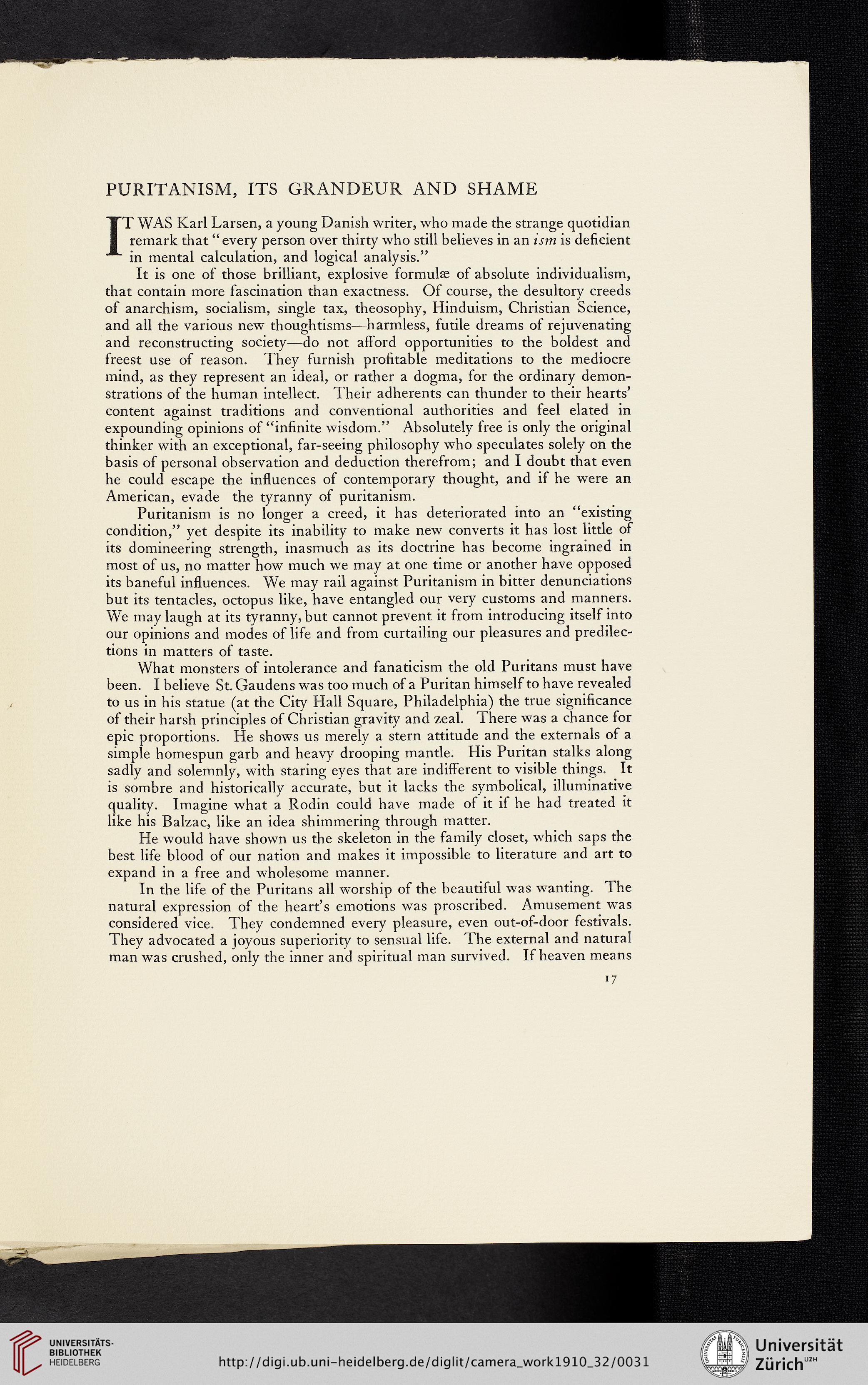Für diese Seite ist auch eine manuell angefertigte Transkription bzw. Edition verfügbar. Bitte wechseln Sie dafür zum Reiter "Transkription" oder "Edition".
PURITANISM, ITS GRANDEUR AND SHAME
TT WAS Karl Larsen, a young Danish writer, who made the strange quotidian
remark that “ every person over thirty who still believes in an ism is deficient
in mental calculation, and logical analysis.”
It is one of those brilliant, explosive formulae of absolute individualism,
that contain more fascination than exactness. Of course, the desultory creeds
of anarchism, socialism, single tax, theosophy, Hinduism, Christian Science,
and all the various new though tisms—harmless, futile dreams of rejuvenating
and reconstructing society—do not afford opportunities to the boldest and
freest use of reason. They furnish profitable meditations to the mediocre
mind, as they represent an ideal, or rather a dogma, for the ordinary demon-
strations of the human intellect. Their adherents can thunder to their hearts’
content against traditions and conventional authorities and feel elated in
expounding opinions of “infinite wisdom.” Absolutely free is only the original
thinker with an exceptional, far-seeing philosophy who speculates solely on the
basis of personal observation and deduction therefrom; and I doubt that even
he could escape the influences of contemporary thought, and if he were an
American, evade the tyranny of puritanism.
Puritanism is no longer a creed, it has deteriorated into an “existing
condition,” yet despite its inability to make new converts it has lost little of
its domineering strength, inasmuch as its doctrine has become ingrained in
most of us, no matter how much we may at one time or another have opposed
its baneful influences. We may rail against Puritanism in bitter denunciations
but its tentacles, octopus like, have entangled our very customs and manners.
We may laugh at its tyranny, but cannot prevent it from introducing itself into
our opinions and modes of life and from curtailing our pleasures and predilec-
tions in matters of taste.
What monsters of intolerance and fanaticism the old Puritans must have
been. I believe St. Gaudens was too much of a Puritan himself to have revealed
to us in his statue (at the City Hall Square, Philadelphia) the true significance
of their harsh principles of Christian gravity and zeal. There was a chance for
epic proportions. He shows us merely a stern attitude and the externals of a
simple homespun garb and heavy drooping mantle. His Puritan stalks along
sadly and solemnly, with staring eyes that are indifferent to visible things. It
is sombre and historically accurate, but it lacks the symbolical, illuminative
quality. Imagine what a Rodin could have made of it if he had treated it
like his Balzac, like an idea shimmering through matter.
He would have shown us the skeleton in the family closet, which saps the
best life blood of our nation and makes it impossible to literature and art to
expand in a free and wholesome manner.
In the life of the Puritans all worship of the beautiful was wanting. The
natural expression of the heart’s emotions was proscribed. Amusement was
considered vice. They condemned every pleasure, even out-of-door festivals.
They advocated a joyous superiority to sensual life. The external and natural
man was crushed, only the inner and spiritual man survived. If heaven means
7


